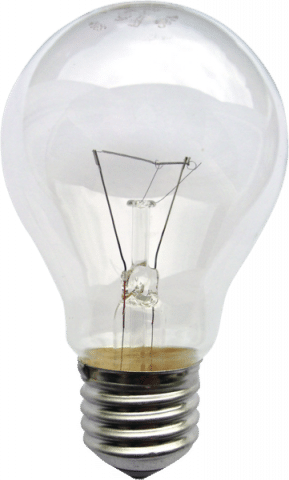The examples of conservative misinformation—devoutly believed by followers, repeatedly asserted by ideological leaders and media outlets—are growing too numerous to count. I seriously cannot keep track any longer, and this is an area where I specialize.
A new one has cropped up: Call it light bulb madness. My sometime co-blogger Jon Winsor, FrumForum, and Joe Romm/Media Matters have all you want to know about it. Brief summary: Many conservatives, and conservative media outlets (Rush Limbaugh, Fox News) are claiming that a 2007 law about to take effect banned incandescent light bulbs, and thus rammed compact-fluorescents down our throats.
It’s the kind of cry virtually assured to make individualist-slash-free market conservatives angry: How dare the government touch my freedoms? And it has even led to legislation to reverse the “ban,” sponsored by Texas’s Joe Barton.
Trouble is, there is no “ban.” Rather, the law required greater lighting efficiency, and some inefficient incandescents will accordingly be phased out beginning in January 2012, but you can still buy other versions. What has actually happened is that the legislation caused the lighting industry to retool and put more energy efficient incandescents on the market—and in fact, the industry wanted these standards in the first place.
Here are the facts, from David Jenkins of Frum Forum:
The bulb ban rhetoric is a deliberate misrepresentation of a provision of the 2007 Energy Independence and Security Act (ESIA) that sets efficiency standards for general-purpose screw-in incandescent light bulbs. The new standards—for what the industry calls “medium screw-based bulbs”—are set to take effect in January.
Major lighting manufacturers helped draft the new standards so that they could avoid a patchwork of state standards. They are fighting the repeal proposal because it threatens to strand the investments they have made to retool and produce lighting products that meet the standards.
In addition to claiming that the incandescent bulb is being banned and that we are all going to be forced to use compact fluorescent lighting (CFL), Barton is also saying that bulbs meeting the new standards are cost prohibitive.
Again, not true. A Philips incandescent bulb that meets the new standards currently sells for $1.49, lasts about 50 percent longer than older incandescent bulbs, and saves consumers more than $3.00 in energy expenditures. For four bucks you can buy an incandescent that lasts 3000 hours and nets you more than $10 in energy savings.
And here are the kinds of misrepresentations that are afoot, for instance from Fox News’s Forbes on Fox:
DAVID ASMAN (host): I hate fluorescent bulbs. They make me feel sick. They give me a headache. And when they break, they create all kinds of stuff — starting in just seven months from now, we won’t be able to buy an incandescent bulb.
VICTORIA BARRET, FORBES: I know. I’m actually hoarding the old-fashioned bulbs.
ASMAN: Me too.
BARRET: I went on Amazon.com and I bought, I’m not kidding, 80 of them, 80. It’s crazy, but I can’t stand the fluorescent stuff because it takes two minutes to warm up and by the time tow minutes have past, I’m out of my hallway. [Fox News, Forbes on Fox, 6/11/11]
Sadly, this stuff is a matter of course nowadays.
What can we do about it? The falsehoods come so fast and furious now, refuting them is almost meaningless. And minds don’t change if you do, anyways.
We need a much broader national conversation about the prevalence of misinformation, where it is coming from, and the psychological and media dynamics that generate it.
Don’t hold your breath.
Subscribe to our newsletter
Stay up to date with DeSmog news and alerts






